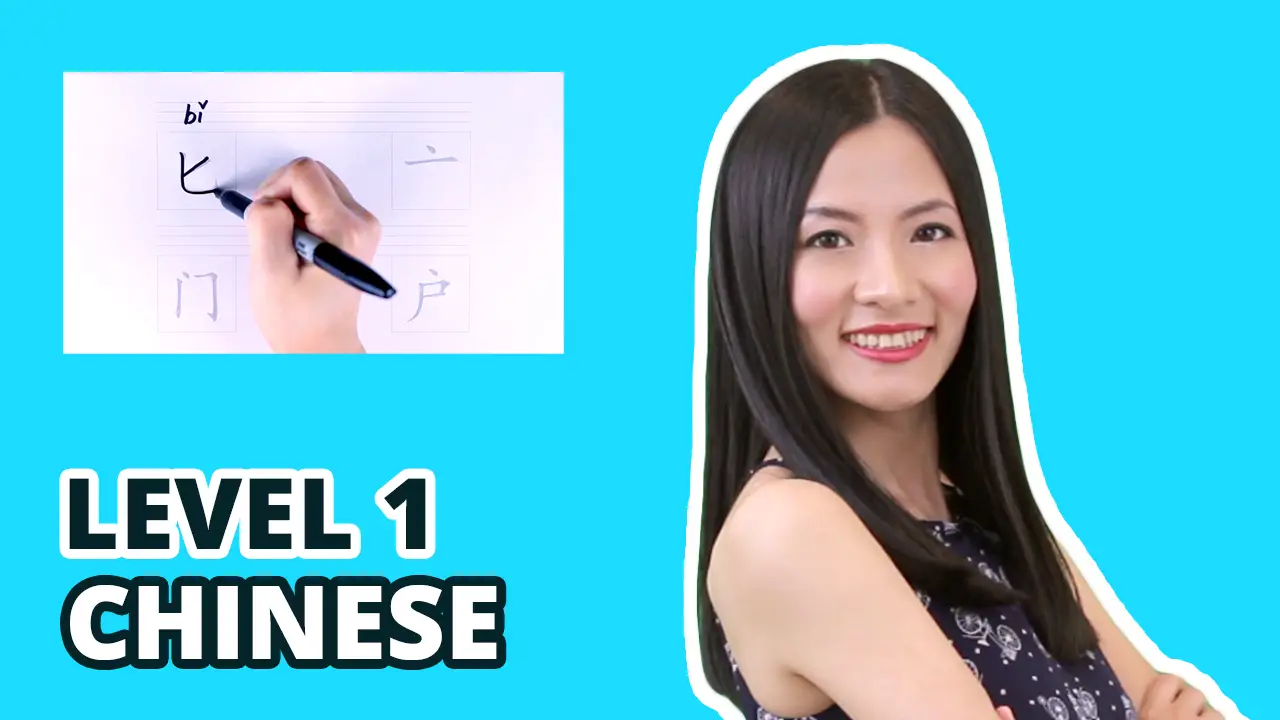Level 1 Lesson 26.1 – He Has Gone To The School
Modal Particle le 了 in Chinese | Zero-Subject Sentence in Chinese 无主句
In this video lesson we'll learn how to use Modal Particle le 了 in Chinese to suggest a "new situation" and we'll also learn about Zero-Subject Sentence in Chinese 无主句 Wúzhǔjù.
- Modal Particle le 了 in Chinese - 了2 (See also Dynamic / Aspect Particle 了 in Chinese - 了1 in Level 2 Lesson 16)
- Zero-Subject Sentence in Chinese 无主句 Wúzhǔjù
- To rain and to snow in Chinese: 下雨, 下雪
- Minute in Chinese: 分 vs 分钟
VOCABULARY
GRAMMAR
Grammar 1: Modal Particle le 了 in Chinese (I)-New Situation · HSK 1
There are a lot of Particles in Chinese, and 了 is probably the most important one. It can either be used as a Aspect Particle or a Modal Particle.
In this lesson we’ll learn about Modal Particle le 了 in Chinese. It indicates that something has happened, appeared, been realized. In other words, the state of something has changed, and there is a "new situation" now.
Compare the two sentences in each group:
- tā shí suì 他十岁。 he is 10 years old [a state]
- tā shí suì le 他十岁了。 he (is) 10 years old (now) [a new state]
- wǒ xiǎng xué Zhōngwén 我想学中文。 I want to learn Chinese [a state]
- wǒ xiǎng xué Zhōngwén le 我想学中文了。 I want to learn Chinese (now) [a new state]
- wǒ bù mǎi fēijīpiào 我不买飞机票。 I don't buy plane ticket [a state]
- wǒ bù mǎi fēijīpiào le 我不买飞机票了。 I don't (plan to) buy plane ticket (anymore) [a new state]
We usually use 了 at the end of a sentence and in such a structure:
Subject + Verb Predicate (+Object) + 了
For example,
With Object
- tā yǒu nánpéngyou le 她有男朋友了。 she has (a) boyfriend (now) [she didn't have one before]
- wǒmen bù xǐhuan chī miàntiáo le 我们不喜欢吃面条了。 we don't like eating noodles (now) [we did like eating it before]
Without Object
- wǒ bù mǎi fēijīpiào 我不买飞机票。 I don't buy plane ticket [a state]
- wǒ bù mǎi fēijīpiào le 我不买飞机票了。 I don't (plan to) buy plane ticket (anymore) [a new state]
Subject + Adj. Predicate + 了
For example,
- nǐde kāfēi lěng le 你的咖啡冷了。 your coffee (is) cold (now) [it was hot earlier]
- Běijīngde fángzi xiànzài piányi le 北京的房子现在便宜了。 houses in Beijing (are) cheap (now) [compared with before]
- sùshède diànshì huài le 宿舍的电视坏了。 the TV in the dormitory (is) broken (now) [it was working earlier]
Subject + N. Predicate + 了
For example,
- wǒ jīnnián shísuì le 我今年十岁了。 I (am) 10 years old this year
- jīntiān shíbā hào le 今天十八号了。 today (is already) the 18th (of the month)
When using the Modal Particle le 了 in Chinese, we are not looking at the Tense, we’re looking at the action or the event itself, and 了 indicates the state of the action or event, that it’s been done or it has happened already. But we’re not pointing out whether the status is in the past, present or future with 了. It could be any of them. For example,
- wǒ zuótiān shísuì le 我昨天十岁了。 I (became) 10 years old yesterday
- wǒ jīntiān shísuì le 我今天十岁了。 I (am) 10 years old (now)
- wǒ míngtiān shísuì le 我明天十岁了。 I (will be) 10 years old tomorrow
Grammar 2: Zero-Subject Sentence in Chinese 无主句 · HSK 1
With 了 sentences, it usually follows this order: Subject Predicate (Object) plus 了, but sometimes we don’t need to say the Subject if it’s obvious. Sentences without a Subject, are called Zero-subject Sentence 无主句 Wúzhǔjù.
Predicate + 了
- xiàyǔ le 下雨了。 (it is now) raining / (it has) rained
- zhīdào le 知道了。 (someone decided by the context) know (already)
- wǔyuè le 五月了。 (it is) May (already)
- wǔgeyuè le 五个月了。 (it has been) five months (already)
- yìxiǎoshí èr shífēnzhōng le 一小时二十分钟了。 (it has been) 1 hour and 20 minutes (already)
Grammar 3: To Rain and to Snow in Chinese · HSK 1
We have learned 下 xià as a Locality Noun meaning "down; underneath; bottom" in Lesson 15, but in this lesson, in 下雨 and 下雪, 下 means "to go down; to fall down". It is used to suggest that for snow or rain to fall down.
- xiàyǔ 下雨 to rain [down falls the rain]
- xiàxuě 下雪 to snow [down falls the snow]
Grammar 4: Minute in Chinese: 分 vs 分钟 · HSK 1
In Lesson 14 of our Basic Chinese Course, we learned that 分 fēn means minute. The word 分钟 fēnzhōng also means minute in Chinese. The difference is that for reading a certain time on the clock, for example 4:20, we can only use 分, not 分钟.
But if we want to say "20 minutes", we use 分钟.
5 Comments
Leave a Reply
You must be logged in to post a comment.

Can we say 买了 and 卖了 for “bought” and “sold”?
In the example sentences why don’t adjectives like 便宜 and 冷 have 很 in front of them?
Adjectives like these, when functioning as the Predicate in a sentence, usually cannot be used independently. This is why 很 has to be used in sentences like 这里很冷。那个手机很便宜。
When they are used with Particle 了, they are already not independent, so there is no need to supplement with other words.
Why not, 苹果手机便宜了,doesn’t the 了 make 现在 redundant?
了 does not suggest “present sense”, it only suggests “a new situation; something changed”. For example we can also say “去年(qùnián, last year)苹果手机便宜了。[Last years Apple Phones (had become) cheaper.]”